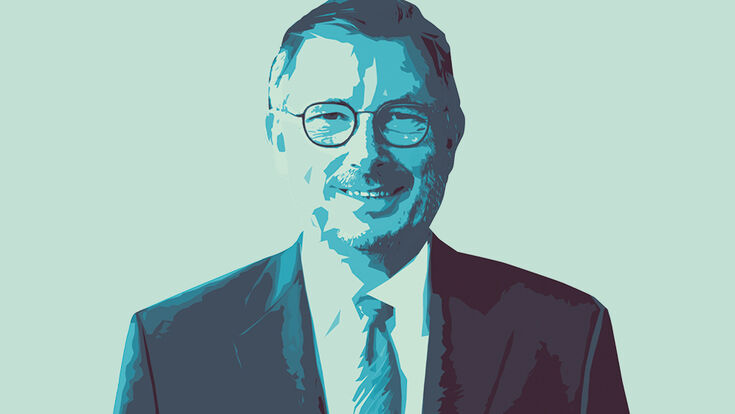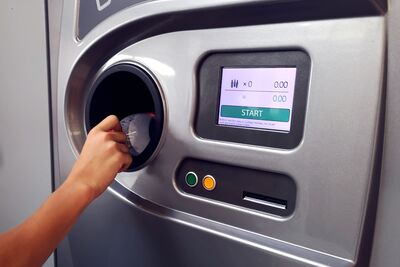Remondis' Herwart Wilms : “Politics must set the right framework conditions and politicians should do what they say.”

Active membership needed
Register now and become a WEKA PRIME member

- Rankings & analyzes from all industries
- All WEKA PRIME content of 12 online-magazines
- 1 E-Paper annual subscription of your choice
- E-Paper in your inbox a week earlier
What role does waste management play in a circular economy?
Waste management – and this includes the entire spectrum from collection, sorting, processing and the provision of semi- and primary raw materials to the safe thermal treatment and pollutant-free disposal of hazardous waste – is an essential pillar of a circular economy. However, it will only become a true circular economy if it begins not with waste, but with the product: only in this way will we in Germany and Europe produce world-leading products, so-called good goods, that are ‘designed for recycling’ and contain high proportions of recycled raw materials.
How must waste management develop in order to be sustainable and enable a true circular economy?
The basis, as already described, is good goods, i.e. goods that can be broken down into their individual parts with little energy input, so that the raw materials they contain are not lost. To this end, the waste management sector must develop the appropriate collection systems, including deposit solutions for example, and use the right sorting techniques to ensure that the raw materials can be returned to the cycle. These raw materials must be of the best quality and have a high degree of purity so that they can help to achieve the climate protection goals.
One example of this is the recycled product TSR40. Thanks to state-of-the-art shredding, dedusting and separation technology, the novel and certified TSR40 is produced from common input materials – such as end-of-life vehicles – which enables it to be used in the blast furnace as well as increasing the recycling share in the converter process and significantly reducing CO2 emissions in steel production. The new fine sorting plant for scrap metals built for this purpose will be opened in Duisburg at the end of April and is part of the REDERS (‘reducing CO2 emissions by increasing the rate of recycled materials in steel production’) research project. This project makes an important contribution on the path to climate-neutral steel production.
Do you want to stay up to date with our articles? Subscribe to our newsletters!
A true circular economy is only possible if it begins not with waste, but with the product.Herwart Wilms, Remondis
What role do product design, extended producer responsibility (EPR) systems and deposit return systems (DRS) play?
It is precisely when we look at critical or strategic raw materials that we realise just how much we are dependent on other countries. More than 98 per cent of the famous ‘rare earths’, which are neither rare nor earths, come from China. So if we want to access these raw materials through products, we need, on the one hand, incentives for producers to make products ‘designed for recycling’ and, on the other, return systems that give us access to high-purity raw materials.
The scarcity of these critical raw materials will lead to global distribution conflicts and even wars. Therefore, it is important to set up such systems now. The Critical Raw Materials Act, or CRM Act for short, which has just been passed at European level, points the way forward, which we in Germany have once again failed to take even though our industry is the one most affected.

Discover now
- Reading
-
Videos
- Eldan at IFAT 2024 Dec 6, 2024
- Cesaro Mac Import and Tiger Depack at IFAT 2024 Dec 6, 2024
- Panizzolo at IFAT 2024 Dec 6, 2024
To what extent should or must politics intervene in a guiding way here?
Politics must set the right framework conditions and politicians must do what they say. They say they want to protect the climate and secure the supply of raw materials for Germany as an industrial location. And they want to do so by using good product labelling, i.e. a label, a minimum quantity of recycled raw materials, a digital product passport that allows recyclers to recognise the ingredients, and public procurement that can buy ‘green’ by using the aforementioned label and thus give preference to the ‘good goods’. It’s all in the coalition agreement – but so far none of it has become reality.
This means that we don’t even have to deal with the question of how good laws of this kind are implemented and controlled in practice because these laws don’t even exist.
If politicians do not understand that there is a direct connection between climate protection and the circular economy and if they leave its potential untapped, we will not achieve our climate protection goals. The energy and transport transition require gigantic amounts of raw materials. If these do not also come from the circular economy, we will not reach our goal.
If the Kreislaufwirtschaftsgesetz (Closed Substance Cycle Waste Management Act) does not – as happened with the Erneuerbaren Energien Gesetz (Renewable Energy Sources Act, EEG) – elevate the circular economy and its operating conditions to a ‘general public interest’ with all the privileges for the use, sale, procurement and accelerated approval of the facilities required for this, it will remain an analogous waste law. Which is all well and good, but it’s a shame about the potentials – which, by the way, are not raised elsewhere.
The EU Green Deal describes several approaches to increasing recycling rates. With the new Packaging Waste Directive, the EU plans to increase recycling rates for packaging materials. Recently, a regulation was also introduced to improve the recyclability of batteries. How do you view these regulations? Do they go far enough? Too far?
Once again, it is Europe that is setting the pace here – unfortunately not Germany, which is always to the detriment of the importance of our domestic patents in recycling technology.
But at least Europe is moving within the framework of its strategy, as laid down in the Green Deal, the main pillar of which is the Circular Economy. And we can start with the politically highly discussed packaging waste, because it is a fast mover. But in terms of quantity, this has no real relevance. In Germany, we place 29 kg of packaging waste per inhabitant per year in the yellow recycling bag on our doorstep. The whole country is talking about that. But nobody talks about the houses we live in and the car outside our house, which as anthropogenic deposits have a real relevance for raw material supply and product design.
We welcome the great European commitment to more producer responsibility, more recycling, good product design, a minimum quantity of recycled raw materials, smart take-back solutions – from the separate collection of household recyclables to deposit systems – and the use of green public procurement. At the end of the waste management chain, where there is nothing left to recycle, pollutant-free disposal must take place through thermal treatment; untreated waste and waste with biogenic components will no longer be landfilled in Europe in the long run. This is also wise and correct in terms of climate protection.
Nobody talks about the houses we live in and the car outside our house, which as anthropogenic deposits have a real relevance for raw material supply and product design.Herwart Wilms, Remondis
How important are legal requirements and guidelines to increase the recycling rate?
If we look at the only real ‘rate’, as you call it, this is the rate that represents how many recycled raw materials are used in all products manufactured in Europe.
This rate has not exceeded the absolutely insufficient level of 13 per cent for years – neither in Europe nor in Germany to any significant extent. However, it is the essential quota because recycled raw materials consume less energy and less land, and are thus kinder to biodiversity. And they are domestic raw materials, so there are no suspicions of child or slave labour and they are produced under secure working conditions with recognised social standards.
We spend a lot of political energy on supply chain laws and the like instead of ensuring good conditions for the circular economy on our own doorstep.
If we were to double this rate of use of recycled raw materials in Germany alone, we could save 65 million tonnes of CO2. Every year. Why should politicians actually refrain from exploiting this potential?
The EU is considering the introduction of standardised pictograms, modelled on the Scandinavian countries, to make recycling easier for end consumers and thus increase recycling rates. The idea is to print a symbol on each product that corresponds to a recycling bin. Do you think such measures make sense?
Our company founder, together with others of his generation, fought to ensure that we have as uniform a colour language as possible for the collection of recyclables close to households. Brown, yellow, blue and black speak to people; they know what belongs in these and what doesn’t. Such standards are important for guidance and to help people do the right thing. Because the vast majority want to do the right thing. We need to expand this system and link it to as many practised behaviours as possible. We recognise good electrical and food products through a printed ‘traffic light’. Green means that everything is fine; you can buy, eat or drink the product. Red means stop; that’s not good. All products – not just packaging – need this kind of traffic light system that tells us whether the product contains many recycled raw materials and whether it is designed for recycling.
If a product is labelled ‘green’, I can safely buy it. And as a public, commercial or industrial buyer, I know that I can buy it with legal certainty and avoid future additional costs due to CO2 pricing.
How important is cooperation between the different sectors in general and within the waste management industry in particular, especially with regard to a functioning circular economy?
If it is to be a real, and if necessary also digital, circular economy, developers, designers, engineers and marketing people from the producers have to sit down at the same table with the recyclers. And this is already happening: in order to avoid future supply bottlenecks for raw materials, manufacturers are already sitting down with our specialists, jointly developing product passports to identify the raw materials in the product, getting to know each other’s production and recycling processes, and talking about real cycles.
And this is also right: extended producer responsibility, which is after all the regulatory principle for the return and recycling of products and packaging, must come from these producers in the interest of these producers and drive the process out of the product interest, so to speak. The resulting costs in the chain must be priced into the product. Then everyone, including the consumer, will make the right decision.
In our company, we have already founded a number of joint companies with producers and are consistently developing them in this direction. In doing so, we recognise that the future secure supply of the right raw materials is often much more important to producers than the ‘product secret’ that was always held in such high regard in the past. This is how we move forward together.
Where do you see the biggest challenges for recyclers?
Our recommendation for product development engineers is somewhat stolen from the Catholic church. It is: Whatever people put together should be able to be taken apart again.
If this works as a guiding principle of the new engineering art, we are happy. If not, the nonsense that you can marvel at on every wind turbine rotor blade in Germany will happen: as citizens, we are spending triple-digit billions on the energy turnaround, but no one in politics has introduced the condition that we only spend the money if the rotor blades can also be recycled again at the end of their useful life. And that is why we now have a huge problem: we cannot recycle, we cannot incinerate, we can only bury. This is the technical culmination of the energy transition in Germany. And everyone is watching and silent. So it will continue.
To what extent have the supply chain difficulties of recent years affected waste management?
Customers want secure access to raw materials that they weren’t able to get during the crisis because supply chains were interrupted.
How high quality are secondary raw materials?
High quality means that they protect the environment through lower losses of biodiversity, make contributions through lower CO2 footprints, are regionally available, domestic raw materials and above all that they satisfy the growing hunger for raw materials. In 2011, 67 billion tonnes of raw materials were produced worldwide. The forecast for 2060 is that we will need 167 billion tonnes of raw materials worldwide. So they are true ‘peacemakers’ and, incidentally, there is nothing secondary about them. In almost all respects they are superior to the so-called primary raw materials, from the CO2 balance, the drastically lower use of land and environmental protection to social aspects such as child labour. That is why we only refer to recycled raw materials.

Is there a sufficiently large market for secondary raw materials? How has it developed over the years?
In the volatile market of recycled raw materials, we have different drivers of supply and demand: when the oil price is below the zero euro mark, as happened a few years ago, selling recycled raw materials is a difficult undertaking, so we need regulations for these markets.
In an ideal world of the circular economy, the producer is its own raw material supplier and ensures that enough material is available in the market. But this is only possible with products that are ‘designed for recycling’. We have to deal with physical limits to recycling anyway, which are set by dissipation, abrasion, thermodynamics and human behaviour. In this respect, recycling cannot solve everything; however, as one of the three pillars of the raw materials strategy, it is of particular relevance alongside international free trade and the raw materials in our own earth.
The EU is effectively planning a ban on waste exports. Does that make sense?
Waste should not be exported, but good raw materials and their preliminary products must be able to be sold worldwide in free trade. Because otherwise we couldn’t import them either! And that is what we really depend on.
It is morally reprehensible, indeed socially unacceptable, that we still have municipalities, cities and districts in Germany where an organic waste collection bin is not even provided.Herwart Wilms, Remondis
Let’s take a quick look at biogenic waste: biogas and biomethane are an interesting alternative to fossil fuels. Nevertheless, they seem to be pushed into the background somewhat. Should politics – and industry – be focusing on them more?
All biogenic wastes are interesting in the energy transition. They have helped to minimise CO2 in the recent past, and at the end of their life they can be used in a cascade both as biogas and as compost on the fields of our farmers, who can thus save on other fertilisers.
It is therefore morally reprehensible, indeed socially unacceptable, that we still have municipalities, cities and districts in Germany where an organic waste collection bin is not even provided. And this is despite the fact that there has been a legal obligation to do so since 1 January 2015. Ten per cent of cities and districts do not provide an organic waste collection bin, despite the legal obligation. I’d like to see what would happen if 10 per cent of those liable for income tax said, “I’m not interested in income tax law.” That would lead to a prison sentence!
Due to the fact that we do not have an organic waste collection binin these cities and that in some municipalities we collect less than 20 kg per inhabitant per year because the statute is not convenient for the user, German society misses out on more than six million tonnes of biowaste every year because it is still idiotically incinerated.
Farmers pay horrendous prices for mineral and other energy-intensive fertilisers, food prices go through the roof and the mayors of some municipalities allow us to burn six million tonnes of biowaste. There is an urgent need for environmental policy intervention here and also for strong sanctions.
About Herwart Wilms, Managing Director of REMONDIS
Studied economics, social sciences and German studies
1989–1991: Legal traineeship in Düsseldorf and Mönchengladbach
1991–2002: Worked at a medium-sized associated company of RWE-Umwelt AG
Initially responsible for personnel development, then for sales, marketing and public relations
2002–2004: Spokesman of the Management Board of RWE Umwelt Rhein-Ruhr GmbH, the management company of RWE Umwelt in the regions of Bochum, Essen, Mühlheim, Oberhausen, Duisburg, Düsseldorf and Mettmann district
2004–2005: Overall sales management for commercial and industrial customers, municipal customers and dual systems at RWE Umwelt AG
2005–present: REMONDIS SE & Co KG: Managing Director of marketing, public relations and public affairs for the REMONDIS group of companies


